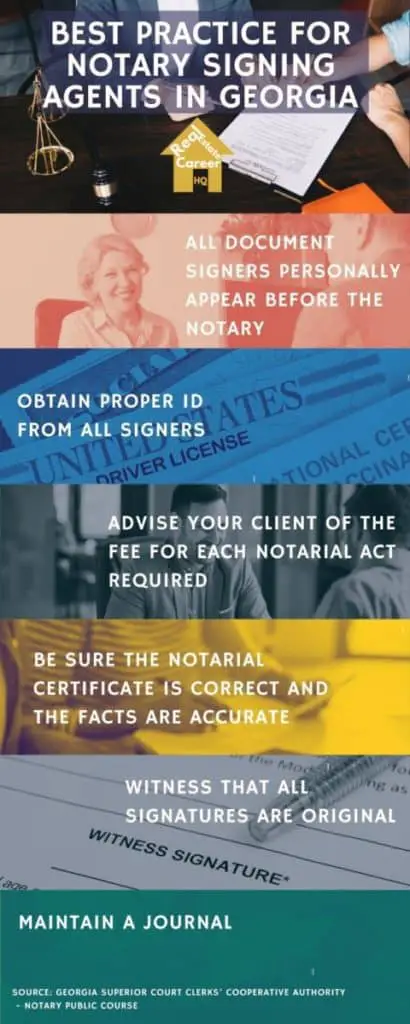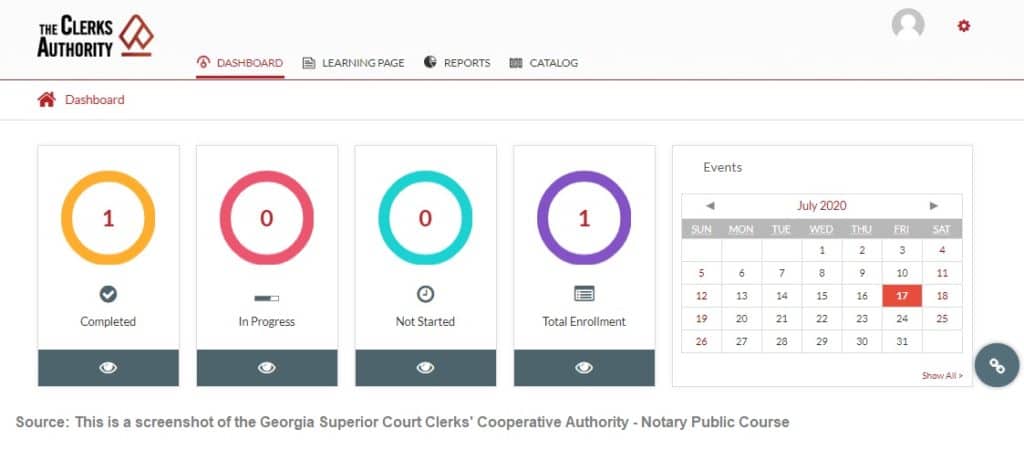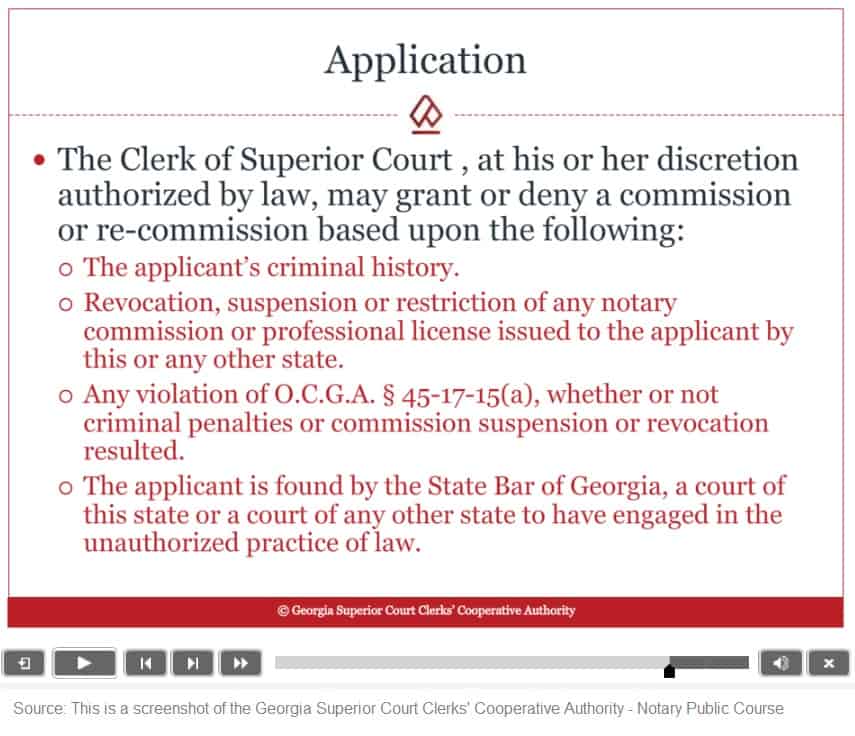(**) Disclosure: This post may contain affiliate links, meaning RealEstateCareerHQ.com will get a commission if you decide to make a purchase through the links, but at no additional cost to you.
To become a notary signing agent in Georgia, an applicant must submit an online Notary Public application to the Georgia Superior Court Clerks’ Cooperative Authority (GSCCCA), pay the filing fee, purchase the notary seal and other business supplies.
Although you could work on different types of documents, the loan signing business in the real estate market seems to be a lucrative niche.
So what does a loan signing agent do? When people are getting a mortgage to purchase a house, or they need to refinance their property, there will be loan documents involved. Your role as a notary loan signing agent is to walk through the set of loan documents with the borrower and witness them in signing the paperwork.
You would also need to verify the identity of the signers, place the notary stamp on the signed documents, then send them back to the signing services company or closing attorney.
But keep in mind that you should NOT be providing legal advice, and you cannot explain the terms of the loan documents to the borrower.
In this guide, you’ll learn the steps to become a notary signing agent in Georgia, income updates, and FAQ about this profession.
But before we start, I want to give a brief disclaimer. This post is not intended as legal advice or state/federal notary public training. It is for general information only. Please check with your state to be sure that loan signing agents are utilized in the closing process. Always follow your state’s notary laws and best practices.
Would you like to learn how to make $75 to $200 per signing appointment? You must check out the Loan Signing System from Mark Wills. (**) This is one of the best training programs for loan signing agents. Many students have achieved remarkable business success after taking this program.
6 Steps to Become a Notary Signing Agent in Georgia

Step 1: Meet the eligibility requirement
- Be at least 18 years of age
- Be a U.S citizen or legal resident
- Be a legal resident of the county that you put in the application.
- For a non-Georgia resident,
- you must reside in a state bordering of Georgia and conduct business or profession in Georgia. (Bordering states include Florida, Alabama, Tennessee, North Carolina, and South Carolina)
- Alternatively, you can be regularly employed in the Georgia county of application.
- Be able to read and English
Step 2: Submit the notary commission application to the Georgia Superior Court Clerks’ Cooperative Authority
The Clerk of Superior Court is the office that grants the notary commission to applicants and maintains records of all notaries public in Georgia.
You need to submit an online notary commission application to the Georgia Clerk of Superior Court.
Most of the questions on the application are pretty strict forward—for example, your name, business address, background info. Make sure the name on the application will be the same as when you are notarizing documents.
The registration fee varies across different counties, but it typically ranges between $36 to 51.
The Georgia Clerk’s Office needs to ensure you are a trustworthy person
As part of the application process, you must provide two endorsements who could attest to your character. You need to include their name, gender, and address, phone, and email. Keep in mind that they cannot be a family member or your employer. They must be 18 years of age or older and resident of the county that you are applying to.
Step 3: Take an oath of office

Then you will get an oath of office in front of a notary public or an officer that is authorized to administer oaths.
Once your application is approved, the Clerk’s office will issue the notary commission. You should review it and make sure all the details are correct. (e.g., your name, county of residence, commission dates).
Step 4: Get a notary seal

To start the notary signing business in Georgia, you must have a notary seal. This helps you to include specific info in every document so you won’t leave out any required details.
You may purchase the notary seal from office supplies store. Although the Georgia law does not specify size and shape of the seal, its content must comply with the regulatory requirement.
Such seal shall have the notary’s name, the words “Notary Public”, the county of appointment, and the name of the state.
Embossment of notarial certificate by such seal is authorized but not necessary, and the use of a rubber or other type stamp shall be sufficient for imprinting the notary’s seal.
Quote from the Georgia Notary Law
Unlike most other states, where the commission expiration date is engraved in the seal, Georgia law does not allow the seal to contain this detail. So when you are performing a notarial act, you simply write: “My commission expires ___“
Furthermore, you must keep the notary seal in a locked and secured area, where only you have direct and exclusive control of it. (e.g. a locked drawer or cabinet.)
Step 5: Obtain a notary journal

As a notary signing agent in Georgia, the State law does not require you to keep a business journal.
However, maintaining a good record of your notary acts is an essential part of good business practice. It could serve as proof that you have taken reasonable steps to identify the signer of a document. That is why many notaries would keep a business journal.
It is better to have one bounded with pre-printed pages. You may find it at stationery, office supply stores, or through notary associations.
For the states that require notary signing agent to maintain a journal, they typically would recommend taking notes of the following:
- Name and address of the signer;
- Date of the notarization;
- Method by which each person was identified to the notary;
- Type of official act (oath or affirmation, acknowledgment, protest, notary as an official witness);
- Type of document involved (deed, mortgage, lease, motor vehicle form, deposition, etc.);
- The fee charged; and
- Signature(s) of person(s) signing document.
Furthermore, it is better to retain the journal for a reasonable period. Some states would require a notary signing agent to keep them for at least ten years.
Step 6: Maintain the notary commission
The notary commission’s term is effective for four years, and then you will need to renew it.
If you have already created the notary profile on the Georgia Clerk of Superior Court website, the renewal can be done through their online system. Then you would take the signed application to the Clerk of Superior Court in your county. Pay the appointment fee and take the oath of office.
To avoid an interrupted business period, begin the renewal process in advance. Don’t wait till your current notary commission is expired.
Since the notary seal does not have an expiry date, you may continue using the existing one if there is no information change.
Here’s a Snippet of What Stephanie Espinal Think about Being a Notary Signing Agent!

“My advice is that don’t be afraid to start the loan signing career on a part-time basis. I would also tell them that they need to be passionate about the profession and not just because of the money. They must dedicate their time to learning the business and notarial laws from your state.
You will be working with people’s financial lives and any mistake you make with cause them a lot of money.”
– Stephanie Espinal, Notary Loan Signing Agent
Here’s an exclusive interview with Stephanie. In there, she shared what it takes to be a notary signing agent as a side gig, her valuable journey, and secret sauce to success.
Here are some best practice guidelines for notary signing agents

Can I perform remote online notarization in Georgia?

Remote online notarization allows you not to be physically present with the signer. Instead, you would verify their the signer’s identity through video and audio conference.
At the time I’m writing the post, there are emergency rules imposed in many states, which allows remote notarization. The good news is Georgia is one of them. You may find the rules for Remote Notarization on the Department of Revenue website.
However, this could be a temporary measure due to the emergency. But whether they would revert to in-person notarization afterward is unknown yet. Therefore, you should check with the Clerk of Superior Court.
If you want to know how can you work from home as a notary? The tools that you’ll need in your home office. Here’s the post for you.
How much can you make as a notary signing agent in Georgia?

The average annual income of Loan Signing Agent in Georgia is $49,046. The income typically ranges between $26,890 to $54,676. Top earning loan signing agents in Georgia are making over $81,566.
As mentioned earlier, you could work on different documents, but the loan signing in the real estate market could be a lucrative niche.
Top 10 Highest Paying Cities for Loan Signing Agents in Georgia
| City | Annual Salary |
|---|---|
| Atlanta | $54,838 |
| Augusta | $48,971 |
| Athens | $44,961 |
| Sandy Springs | $44,409 |
| Savannah | $44,387 |
| Gainesville | $43,712 |
| Roswell | $43,178 |
| Macon | $41,737 |
| Columbus | $40,912 |
| Warner Robins | $39,520 |
Can you make over $10,000/month as a loan signing agent? Be sure to check out our notary earning guide. You’ll find a case study where a loan signing agent has built her business to such a successful figure.
(+) Source: ZipRecruiter.com – March, 2022
Is there demand for notary loan signing agent in Georgia?
As long as people are obtaining mortgages or refinancing their homes, there would be a demand for loan signing agents.
All originated mortgages in Georgia
| YEAR | All originated mortgages |
|---|---|
| 2017 | 244,731 |
| 2016 | 264,802 |
| 2015 | 232,822 |
| 2014 | 185,375 |
| 2013 | 262,544 |
| 2012 | 277,607 |
| 2011 | 204,582 |
| 2010 | 208,728 |
| 2009 | 261,989 |
| 2008 | 244,230 |
| 2007 | 352,181 |
Source: Consumer Financial Protection Bureau – Home Mortgage Disclosure Act (HMDA) (July 16, 2020)
Some states are “Attorney States,” which means only attorneys can coordinate the closing paperwork. Whereas, others are “Escrow States” where escrow companies would handle the mortgage closing.
According to the First American Title, Georgia is a an “Attorney State.” Here is a post that talks more about the differences escrow states and attorney states. And how would it impact your loan signing business?
If you want to succeed in the loan signing industry, you must check out this loan system training program. If you review the testimonials of his students, you’ll be amazed at how the notary career changes their life after they learned from Mark Wills. (**)
What education do you need to become a Georgia notary signing agent?

There is no education requirement to become a notary signing agent in Georgia. But to achieve the best business practice in this profession, you should always equip yourself with updated notarial knowledge.
A fantastic way to do so is by taking the training course at The Clerks Authority website. It pretty much covers most of the things you need to know about being a notary in Georgia. In fact, I used it as a reference to prepare for this guide.
The topics include:
- Course Overview
- Origins and Qualifications
- Application
- Terms of Office & NP Seal
- Change of Address of Name
- Professional Responsibility
- Misconduct
- Revocation of Commission
- Authorized Duties & Signing Specifications
- Unauthorized Practice of Law
- Guidelines for Acceptable ID
- Notarial Certificate & Seal
- Best Practices
- Challenging or Difficult Notarizations
- Challenging or Difficult Notarizations Examples

The contents are displayed in a slideshow format and are straightforward to understand. It would take only a few minutes to go through each topic. I tried taking the course this morning, and it only took me around 45 minutes to complete it.
There is no fee to enroll in the notary training. You just need to sign up for an online portal with your name and email address. Then you could access the course materials within minutes.
After you are done, you may consider taking the “GSCCCA Notary Public Final Exam.” The fee is $10. But the exam is optional. It is just a way to evaluate how well you know the materials.
How much does it cost to become a notary in Georgia?

It would cost approximately $93 to become a notary in Georgia.
Here’s a breakdown of the costs to start a notary signing business
| Notary Application | $36 to $51 |
| Notary Stamp | $17 |
| Journal (Optional) | $15 |
| Notary Public Final Exam (Optional) | $10 |
There could be other expenses involved, E&O insurance, travel expenses, car maintenance, auto insurance, remote notary technology, laptop and other business supplies.
Can a felon be a notary signing agent in Georgia?

Having a conviction for a felony may impact the application to become a notary signing agent in Georgia. The Georgia Clerk of Superior Court needs to make sure that you are a person with credibility, truthfulness, and integrity to fulfill the responsibilities of the position.

But having a felony does not necessarily mean your application will automatically be declined. It depends on the severity and nature of the conviction. The Georgia Clerk of Superior Court would review it on a case-by-case basis.
…applicants must declare all denials, revocations, suspensions, restrictions or resignations of a notary commission and all criminal convictions, including any plea of nolo contendere, except minor traffic violations.
Quote from Georgia Superior Court Clerks’ Cooperative Authority – Notary Public Course
How long does it take to become a notary signing agent in Georgia?

One thing I like about their online system is how it could streamline the entire application process. This eliminates the cumbersome signature process and mailing time.
Once the Georgia Clerk of Superior Court receives your application, they have a maximum of 10 days to either approve or deny a commission. But the turnaround time is usually quicker than that.
Then it would depend on how long it takes you to get an oath of office before a notary public.
So give or take, you can become a notary signing agent in Georgia within a two weeks.
Can a Georgia notary notarize out of state?
No, a Georgia notary cannot perform notarization out of state. One can only perform notarial acts within the geographical boundaries of the notary’s state of commission.
Can I notarize for a family member in Georgia?

You must not notarize any documents where you have any financial or beneficial interest in the transaction. Therefore, notarizing a document for any family member could call into question, and such practice should be avoided.
I have more questions about being a notary signing agent in Georgia, where could I obtain more details?
You may contact the Georgia Clerks’ Cooperative Authority:
- 1875 Century Boulevard, Suite 100, Atlanta, GA30345
- Tel (404) 327-9058
- Fax (404) 327-7877
Video on Becoming a Notary Loan Signing Agent in Georgia
If you are reading up to this point, I bet you must be interested in the notary signing profession. But why reinvent the wheel when there is a proven system that works? Many students had great success following the Loan Signing System (LSS) from Mark Wills. You may click here to check it out yourself. (**)
Disclaimer: The information in this post is for general information only, and not intend to provide any advice. They are subjected to change without any notice, and not guaranteed to be error-free. Some of the posts on this site may contain views and opinions from individual not related to JCHQ Publishing. They do not necessarily reflect our view or position.
(**) Affiliate Disclosure: Please note that some of the links above are affiliate links, and at no additional cost to you. Our company, JCHQ Publishing will earn a commission if you decide to make a purchase after clicking on the link. Please understand that we include them based on our experience or the research on these companies or products, and we recommend them because they are helpful and useful, not because of the small commissions we make if you decide to buy something through the links. Please do not spend any money on these products unless you feel you need them or that they will help you achieve your goals.
Reference:
- First American Title- Your Guide to Real Estate Customs by State (source)
- Georgia Superior Court Clerks’ Cooperative Authority
- Office of the Governor: Executive Order 04.09.20.01, Temporarily Allowing Remote Notarization and Attestations (source)
- Salary.com – Notary Signing Agent Salary in Georgia (source)
- ZipRecruiter – Loan Signing Agent Salary in Georgia (source)
- Consumer Financial Protection Bureau – Home Mortgage Disclosure Act (HMDA) (source)

